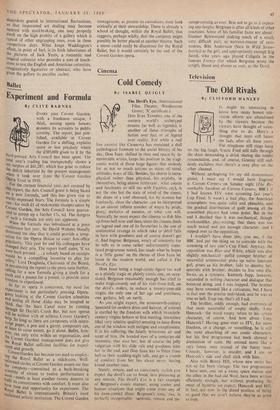Ballet
Experiment and Formula
By CLIVE BARNES EVERY year Covent Garden, with a frankness unique, I think, among opera houses,'
-presents its accounts to public scrutiny.. The report, just pub- lished, available at Covent Garden for a shilling, explains more or less precisely where
the E505,000 given to it by the hard-presseo Arts Council has been spent. The total year's trading has unexpectedly shown a net surplus of £61,287, which has gone to reduce the deficit inherited by the present management When it took over from the Covent Garden Opera Trust in 1950. For the current financial year, not covered by this report, the Arts Council grant is being based on a new formula, and this has given rise to warily expressed fears. The formula is a- simple 'ne—for each it of reckonable receipts taken by Covent Garden, the Arts Council have guaran- teed to stump up a further I7s. 6d. The dangers 01. such a formula are only too apparent. When the formula Was introduced at a press conference last year, Sir David Webster,. blandly dismissed the idea that it couldprovide a temp- tation for the Opera House to court box-office POPularity. This year he and his colleagues have Chang ed their aria. The report itself states, 'if we were hard preSsed a subsidy based on receipts would be a compelling incentive to play for ,safety' Lord Drogheda; Chairman of the Board, in introducing the report to the press went further, *calling for a new formula giving a tooth for a t,,t)otb and a pound for a' pound, to provide some treedom to experiment. So far as opera is concerned, the need for. experiment is not particularly pressing. Opera- goers looking at the Covent Garden schedules and noting all those Aldus may be tempted to think that the Suez Canal must . be running through :" 6 Sir David's Crush Bar, but new operas Z'1,4 be written with or without Covent Garden's "ell). SO long as there are.composers with manu- Script paper, a pen and a garret, composers can, at least to some extent, go it alone. Ballet, how- ever, Can an only exist within an organisation, and the Covent Gardent management does not give t fie Royal Ballet sufficient facilities for experi- latent and growth.
Covent Garden has become too used to employ-
:Ltl, es at g' the Royal Ballet as a milch-cow. Well- informed circles Covent Garden assure me that the coMpany—committed to a back-breaking ;euedole of eleven to twelve performances a f ee k—needs at least another twenty dancers to its commitments with comfort. It must also .114. ve time and oppOrtunity for experiment. The °MI Ballet is internationally Britain's most acclaimed artistic institution. The Covent Garden
management, at present its custodians, must look critically' at their stewardship. There is already a school of thought, within the Royal Ballet, that suggests, perhaps wildly, that the company might possibly be better placed at another theatre. Such a move could easily be disastrous for the Royal Ballet, but it would certainly be the end of the Covent Garden opera.






























 Previous page
Previous page